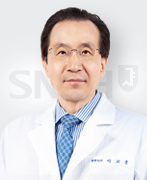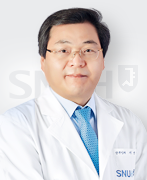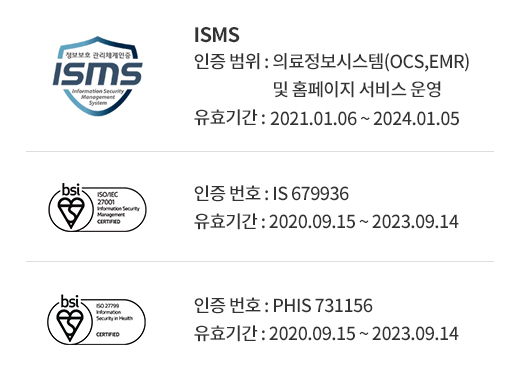Obstetrics & Gynecology
- Introduction to the Department
Obstetrics and Gynecology plays the major role as a woman’s health manager, throughout childhood, puberty and even after menopause. The Department of Obstetrics and Gynecology at Seoul National University Bundang Hospital is making ceaseless efforts to provide the best medical services for women's health and happiness.
1. Obstetric care: High-risk pregnancy such as preterm birth, multiple fetuses, and placenta previa are managed at the highest level.
1) The Center for High Risk Pregnancy in Gyeonggi-do Area
The Obstetrics Department at Bundang Seoul National University Hospital is designated as the Center for High Risk Pregnancy in the Gyeonggi-do Area by the Gyeonggi-do Ministry of Health and Welfare. We treat various high-risk pregnant mothers and work in close cooperation with the Department of Pediatrics in the event of unavoidable preterm delivery of any reasons, then provide integrated care to the child from management at the neonatal intensive care unit to early childhood treatment. We are doing our best to improve maternal and child health in the region by receiving direct transfers from various regional partner hospitals. In addition, we provide quick and accurate fetal chromosome tests (NIPT, chorionic membrane tests, amniotic fluid tests) and targeted fetal ultrasonography that are essential for the best prenatal management in high-risk pregnancy, and help become well prepared for all fetal and maternal conditions, even congenital anomalies. When newborns are required treatment, such as immediate surgery, we have a close linked service with the medical staff of the pediatric surgery department and the best specialists in the relevant department, to make sure the most appropriate consultation and treatments are provided.
2) Professional medical staff in the field of preterm birth and multiple fetuses
Preterm labor, premature rupture of membrane, cervical insufficiency, multiple pregnancy, preeclampsia, fetal growth restriction, and abnormal amniotic fluid volume are all complications of pregnancy that can cause premature birth. In order to keep the fetus inside the belly as close as possible, or to term, whilst maintaining the mother's health, evidence-based tests that can identify the causes and a lot of experience with high-risk pregnancy are needed. Based on many research results, various tests and surgeries are available to predict or prevent preterm birth, and we have special measures prepared for multiple births (twins, triples, etc.), which are one of the high-risk groups for preterm birth. Here, compared to other hospitals, the rate of vaginal delivery of multiple babies is higher, which also means that we are thoroughly prepared for emergencies.
3) Prepared 24/7 for postpartum bleeding
The number of all postpartum hemorrhage patients from the southern part of Gyeonggi and Seoul is highest at our hospital compared to any university hospitals. We ensure prompt treatment by obstetrics and gynecologists, working in close cooperation with the emergency room. Also, uterine artery embolization and hysterectomy are available 24 hours a day. In addition to the intensive care unit specialized for postpartum hemorrhage patients, we have the largest blood for transfusion reserve in the region. Our hysterectomy rate due to postpartum hemorrhage is very low, being less than 1%. Furthermore, we are doing our best to reduce the rate of transfusion and uterine artery embolization by preparing before cesarean section for situations where there is a high risk of postpartum hemorrhage, such as placenta previa.
2. Gynecological treatment: We conservatively treat uterine and ovarian diseases based on advanced treatment technology.
1) Uterine Fibroid Surgery: Advanced Robotic Surgery and Single Incision Laparoscopic Surgery
The Department of Gynecology of Seoul National University Bundang Hospital performs almost all uterine fibroid surgery with minimally invasive surgery that can minimize scarring. In particular, we are performing surgery with an improved method that can minimize scars while maximizing the advantages of robotic surgery. To difficult cases that require quality skills, such as multiple fibroids, huge fibroids, and especially adenomyosis, we apply advanced robotic surgery expecting the best surgical results. We are one of only few hospitals worldwide that perform most gynecological benign tumor surgeries with single incision laparoscopically, called scar-free surgery. In particular, we have the ability to apply single incision laparoscopy to more 90% of our patients with uterine fibroids, which makes Seoul National University Bundang Hospital a leading hospital worldwide.
2) Benign ovarian tumor surgery: minimizing ovarian damage, and preserving ovarian function by performing oocyte cryopreservation before and after surgery.
Seoul National University Bundang Hospital considers preservation of ovarian function as a top priority when treating young women with endometriosis, ovarian cysts, teratomas, etc., which are increasing recently. We use surgical methods that can minimize ovarian damage using laparoscopic surgery and robotic surgery, and we carry out fertility preservation procedures before and after surgery to prepare for possible decline in fertility.
3. Gynecological cancer treatment: optimal treatment aimed at minimally invasiveness and maximum survival
1) Minimally invasive surgery of gynecologic cancers
In the case of early cervical cancer less than 2cm in size and endometrial cancer, we use laparoscopy or robot for surgery in most cases, allowing a high cure rate as well as rapid daily recovery even after cancer surgery. In particular, in the case of young single cancer patients, we adapt surgery to preserve the uterus when we can to enable future pregnancy and childbirth.
2) Gynecological Cancer Clinical Trial Center
We provide cancer patients with the world's most advanced treatment and opportunities to administer new drugs, via actively participating in multinational clinical trials. This is a worthy treatment opportunity especially for advanced and metastatic cancer patients.
3) We operate a rehabilitation program specialized for gynecological cancer patients. We have a systematic rehabilitation program providing continuous management to those who require treatment for intractable side effects with symptoms that are not easily relieved, such as; lymphedema, complications of surgery and pelvic radiation therapy, numbness and abnormal sensations in the hands and feet caused by chemotherapy.
4) Special chemotherapy education to strengthen immunity
Since the immunity of gynecological cancer patients is easily weakened by surgery, radiation therapy, and repeated chemotherapy, it is important to maintain the immunity at a normal level during treatment and during the follow-up period after treatment. There are many immunity-enhancing products and procedures on the market, but their effectiveness has rarely been scientifically proven. If used incorrectly, it may not only harm the patient’s health, but also seriously disturb the progress of the scheduled chemotherapy. We provide practical help to gynecological cancer patients and their caregivers by regularly running chemotherapy education sessions during which we explain in detail, and also kindly, the truth and lies about ‘Immunity enhancement’.
4. Reproductive Endocrinology treatment: the best infertility treatment and fertility preservation methods in Korea.
1) Fertility Preservation procedure
Our Fertility Preservation Clinic provides oocyte, embryo and ovarian freezing treatment for women to preserve fertility before ageing or before cancer treatment. When a young woman is diagnosed with cancer, we seek the most suitable method of preserving fertility for each patient and provide prompt countermeasures to apply appropriate fertility preservation treatment. Seoul National University Bundang Hospital is the centre of the nationwide fertility preservation network, providing the highest level of fertility preservation treatment in Korea.
2) Treatment of infertility
Seoul National University Bundang Hospital Fertility Clinic provides consultations on individual causes of infertility and customized treatments to achieve high pregnancy success rates. Seoul National University Hospital Fertility Clinic that gave birth to Korea's first test-tube baby, and we have inherited their tradition. We provide artificial insemination and in vitro fertility treatment by introducing state-of-the-art fertility treatment techniques without compromising on the tradition and we offer customized infertility treatment based on this. In addition, by making full use of the strengths of being a university hospital, we are showing good treatment outcomes for elderly women, women with intractable infertility and accompanying diseases.
.png
)




.png
)



.png
)


.png
)
.png
)
.png
)






